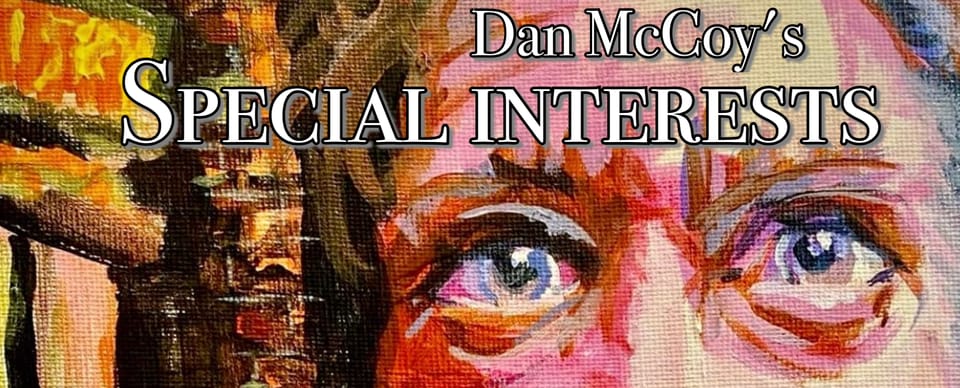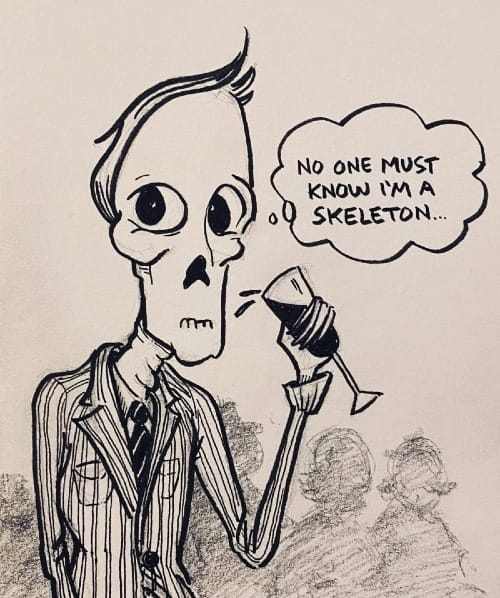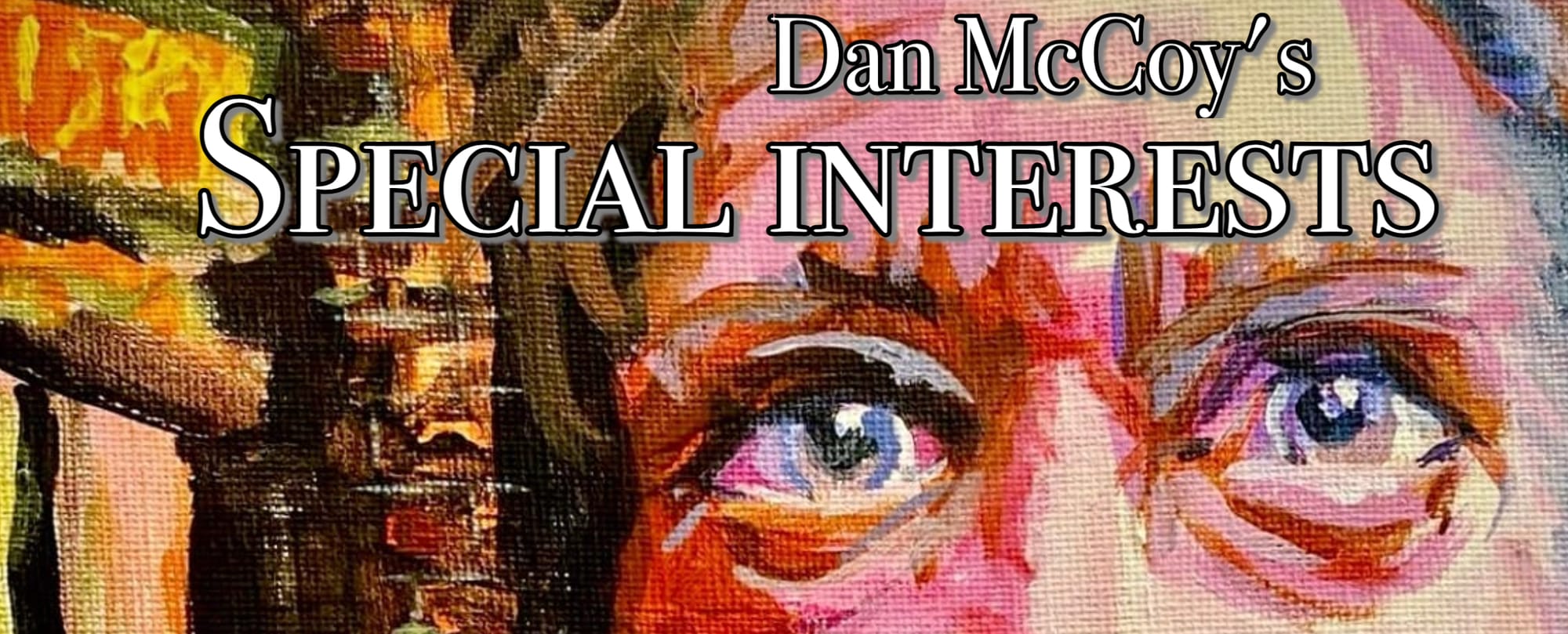"Writing" - The Thrilling Conclusion

This is part two of a duet of pieces on writing and creativity. The first part can be found here, and is recommended, since this is a direct continuation of that earlier installment.
In David Lynch’s Catching the Big Fish, one of his micro-essays explains how an idea develops. It’s the one that (by implication, at least) gives the book its name. I’ll quote it here (and you'll see that I call it a micro-essay advisedly, when I say that this snippet represents about half the chapter).
“...even if it’s a little fish–a fragment of an idea–that fish will draw in other fish, and they’ll hook onto it. Then you’re on your way. Soon there are more and more fragments, and the whole thing emerges.”
In the last installment, I talked about how my work in visual arts has influenced my writing process, and I wanted to briefly touch on drawing again, as a bridge between these essay halves, because the process Lynch describes is similar to how I draw. Sure, sometimes I have a clear picture in my head from the very start, or I’m drawing directly from life, in which case it’s more a process of roughing in the full idea, and then refining until it’s something I can stand to look at – but very often, I have no idea. I simply begin with a line. Very often it’s a line that means nothing to me on its own, but I like the quality, or I like the tactile feel of getting it down on paper, or I’m experimenting with a new pen or new ink. So I lay that line down. And that line, meaningless on its own, suggests another line to me. And another one. And eventually, a drawing emerges.

Writers and artists will often talk about being a vessel for something larger. A writer will be asked where their work comes from, and they’ll say something like “I dunno. It was like the characters were talking through me, and I was just the typist.”
I roll my eyes at stuff like this, not only because it devalues genuine hard work in a way that makes it easier for managerial types to decide that writers don’t deserve things like union benefits, or can be replaced by the infinite monkeys of A.I., and I roll my eyes at it because it smacks of the internalized impostor syndrome I mentioned in part one. (Not that I don’t get it. If I write something good, there’s a part of me, rereading later, that thinks it can’t possibly have come from me – because how did something like this spring fully-formed from my brain? And the answer is: it didn’t. It was put together word by word, brick by brick, fish by fish.)
Mostly I roll my eyes at it because it’s bullshit. It does all come from you. It’s just that, at a certain point, questions of craft become automatic, and you’re able to access a subconscious or semi-conscious part of yourself that’s capable of far greater things than your conscious, critical brain.
But, on the other hand, just because that way of thinking is bullshit, doesn’t mean there isn't something true in it.
This is the stuff I’ve been itching to discuss – the nexus between craft and intuition (or mysticism or something beyond the conscious mind, whatever you choose to call it). And after beginning the previous essay with some lines about how writing is about making choices, I guess it’s pretty rich that I’m only getting to the juice NOW, well into part 2. (Honestly, I could have gotten here sooner, but – I don’t know if it’s the ADHD that makes me more discursive, or I’m just imitating the chatty, digressive writers I enjoyed because of my ADHD, but… I’ve never been a fan of art that’s too “tight.” I find the perfect object boring. It feels inorganic. Impersonal. Inhuman. I’d rather be fascinated by the compellingly imperfect. Should I strive for more concise perfection in my own work, knowing that the imperfection will inevitably come anyway, since I’m deeply imperfect? Perhaps, but: counterpoint – shut up.)
Anyway, the craft/intuition thing is a weird dichotomy that everyone who makes stuff grapples with. When I draw in this sort of automatic-writing-style, and I’m rewarded with something lovely or interesting, rather than gibberish lines? That's not because some ghost hand of the universe is guiding my own. It’s all bubbling up from inside me. Even when I’m letting my conscious mind steer more of the craft, there are certain drawing things I can do very quickly now – things that look better when I do them quickly – that seem like mysteries to me, but they’re actually deep muscle memory. My mind might not understand, but my hand does. Yet, if I give myself entirely over to muscle memory, I’m just as apt to repeat my mistakes as I am to improve. The best drawings (and the best artworks in general) come from a fight between the gut and the head.
I don’t presume to speak about anyone’s journey but my own, but I suspect the usual path tends to look similar. When you’re a beginner, you operate entirely on intuition, because intuition is all you have. Over time, you start developing craft, whether it's self-taught, guided by an expert, or both. Your work might feel like a wonky see-saw for a while, as craft starts to take over, but you’re not fully skilled enough to rely on it. At this point, the interesting raw creativity diminishes before you have the muscles to fully rely on your new toolset. Then, as you internalize craft and skill – once your toolbox is robust – the musculature can stop working so hard and you can return to play. The process starts being fun. Your brain surprises you. The scaffolding is there, and you can rely on it to remain sturdy sturdy, while you swing on it like monkey bars.
This, I think, is what people talk about when they say “I don’t know where the work comes from.” What seems mystical is craft pushed to the highest level. And yet…
Look, I’m dubious by nature. I like what can be tested and proven. An example – I do yoga a few times a week, partly because it’s good for me physically, but in larger part because it’s good for me mentally. I don’t think the reasons it improves my psychological health are mystical (sidebar: I'd like to be clear I’m dubious about the spiritual side of yoga as filtered through a bunch of mostly white Brooklynites, and not scoffing at its place in the spiritual practice of various Indian religions… or at least, not any more than at various other religions, but that’s another story).
No, I think there are clear, explicable reasons it helps me. I think it makes me feel mentally better by making me feel physically better. I think it regulates the nervous system. I think it teaches me to breathe and be patient while holding the most ridiculous physical positions, which helps me breathe and be patient when stuck in ridiculous emotional positions. Even the most woo-woo parts of it, like chanting, have rational benefits – singing helps massage the vagus nerve, which is deeply linked to stuff like heart rate, blood pressure, and mood. Of course it feels good. It also lifts your spirit to have the community of singing with other humans –
…wait a minute. Okay, that last one’s a bit more woo woo after all. A bit more vague. Because I DO think there’s a tiny bit of wriggle room in here. A tiny bit of spirituality in life and creativity that’s difficult, perhaps undesirable, to totally eliminate. I'm fond of my yoga teacher, so I hope she’ll think it’s okay that I don’t buy everything she’s selling (I presume she will, because – to her credit – she always encourages us to ignore whatever we're gonna ignore anyway). When she talks about the phases of the moon, I might roll my eyes a bit, and file it under “The Liberal Equivalent of Vaccine Denial,” but to paraphrase myself – just because something's bullshit, doesn’t mean there's not wisdom in it.
Humans are irrational, so – if we want to understand ourselves, to understand what we don’t understand, and to make a little art that speaks to our lunatic nature, we can’t rely on rationality alone. Why does anyone write or read fiction, if it’s not to speak to some irrational corner of ourselves? Or perhaps to go that extra bit beyond where the provable's able take us, and make sense of the senseless parts of the world. Sweep up those cobwebs.
I wonder if this is a specifically neurodivergent thing, but I often find it easier to understand certain things about my/our brains by thinking of them as computers. (Yeah, computers are very explicitly machine “brains” in many ways, so it's not a wild comparison, but I think it’s probably more common to speak of computers as brains than to use the imitation to explain the original. Anywhoo...) Your brain is an organic machine, taking in data, then writing programs inspired by that input – processes designed to protect you, keep you alive, keep you happy.
From that starting point, one might imagine that the human brain is rational, like a computer is. The hitch is, that – if your brain's a computer, it’s a wonky-ass one. It’s still running programs you downloaded as a kid, ones you really should’ve updated or deleted years ago. There’s malware in there you’re not aware of. You got a ton of garbage input over the years, which results in garbage output. And while there’s a "system manager" part of your mind that monitors your processes for errors, it’s tough to rewrite any of the stuff deep in your memory. Your hard drive is in desperate need of defragmenting.
Is the mystical shit we invent for ourselves just a shortcut past some of the inadequacies of the human mind? A way of dealing with the vast oceans of what we don’t understand by creating a mental framework to handle it? Is it a glitch caused by all the bad software and rotting firmware? Is there actually mystical shit happening, and our shoddy processors can’t handle the fullness of it all, so we just perceive some of it?
And here’s where I say something TRULY shocking. I stopped using pot like a month and a half ago. This is me sober.
My point is that, even when you're creating with your rational mind, there’s always something extra in the mix, blindly guiding your hand, and that's good. You need to be open to the deep subconscious impulses or the happy accidents.
Back to David Lynch: he’s big on impulse and happy accidents. One example is a famous scene from Twin Peaks where an entire exchange plays out with a giant moose head on the table by the actors, and no one mentions the moose head – a decision which makes the entire conversation instantly more compelling. Why did Lynch block the scene like this? Because when he came in, the set decorator hadn’t hung the head on the wall yet. Lynch saw the stuffed moose on the table and said (one assumes yelling in his delightfully nasal Midwestern voice) “LEAVE IT!” And he was right.
What Lynch isn't big on, surprisingly, is getting ideas directly from meditation. Lynch talks about transcendental meditation with zeal, but he claims to have gotten ideas from a meditation session only once or twice in his whole career. Instead, he credits meditation with creating the breathing room in his brain that allows ideas to come to the surface.
This speaks to my own experience. Not with meditation, per se, although it is something I try to do when I can; but in a larger sense. My brain needs space. Everyone’s brain needs space, but my ADHD brain spent a lot of my life needing it more than many people, while simultaneously making it hard for me to give myself the space I craved. My internalized sense that I’m “never doing enough,” or doing it “wrong” has meant I spent years pushing myself until overwhelmed, then feeling shitty and calling myself lazy if I needed time to recharge.
These days, I’ve come to realize that writing happens as much away from the keyboard as in front of it. Sure, a work ethic and regimentation are very important, and I can push myself to churn out material when the situation demands – I mean, fuck’s sake, I spent a decade at The Daily Show where you had to be able to deliver a cogent essay on current events, within about 45-70 minutes, and packed with jokes, no less. But if I'm operating in my own gear, it doesn’t have to work that way.
Nor should it, all the time. If you want to reach that buried, extra stuff, sometimes it’s good to – say – go for a walk. There have been whole pieces I’ve written in my head, while walking. What happens later is just the typing. (Sometimes that typing even feels unnecessary by then, which is a shame, since I think some of those unwritten things were probably pretty good). I think the notion that your brain keeps working on a problem even when you’re not consciously thinking about it is mostly a myth, but the idea that your brain makes space for that problem, getting you primed for subconscious insight later? That I buy.
I guess the conclusion is – Develop your skills. Train yourself, or get trained. But also leave your mental door open to the irrational, the mystical, the barely-conscious. It may not be the universe giving it to you. It’s probably still you. But that's how you get to the deepest, weirdest, most surprising stuff. Sometimes you have to indulge a little irrationality.

For earlier posts, check out the archive. In my other life, I’m a podcaster. Listen to my show The Flop House, here. In my other other life, I’m an Emmy-winning comedy writer. If you’re looking to staff, get in touch! And if you love the newsletter, you can always consider tipping me, by enrolling in the paid tier!
